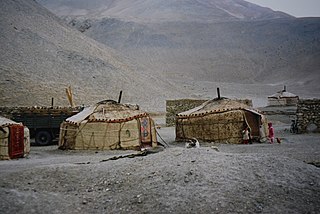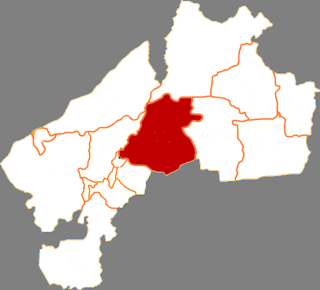Fuyu Kyrgyz may refer to:
- Fuyu Kyrgyz language, a endangered language spoken in China
- Fuyu Kyrgyz people, an ethnic group which live in China
Fuyu Kyrgyz may refer to:

The history of the Kyrgyz people and the land now called Kyrgyzstan goes back more than 3,000 years. Although geographically isolated by its mountainous location, it had an important role as part of the historical Silk Road trade route. Turkic nomads, who trace their ancestry to many Turkic states such as the First and Second Turkic Khaganates, have inhabited the country throughout its history. In the 13th century, Kyrgyzstan was conquered by the Mongols; subsequently it regained independence but was invaded by Kalmyks, Manchus, and Uzbeks. In 1876, it became part of the Russian Empire, remaining in the USSR as the Kirghiz Soviet Socialist Republic after the Russian Revolution. Following Mikhael Gorbachev's democratic reforms in the USSR, in 1990 pro-independence candidate Askar Akayev was elected president of the SSR. On 31 August 1991, Kyrgyzstan declared independence from Moscow, and a democratic government was subsequently established.

The Turkic languages are a language family of at least 35 documented languages, spoken by the Turkic peoples of Eurasia from Eastern Europe and Southern Europe to Central Asia, East Asia, North Asia (Siberia), and Western Asia. The Turkic languages originated in a region of East Asia spanning from Mongolia to Northwest China, where Proto-Turkic is thought to have been spoken, from where they expanded to Central Asia and farther west during the first millennium. They are characterized as a dialect continuum.

Kyrgyz is a Turkic language of the Kipchak branch spoken in Central Asia. Kyrgyz is the official language of Kyrgyzstan and a significant minority language in the Kizilsu Kyrgyz Autonomous Prefecture in Xinjiang, China and in the Gorno-Badakhshan Autonomous Region of Tajikistan. There is a very high level of mutual intelligibility between Kyrgyz, Kazakh, and Altay.

The Kyrgyz people are a Turkic ethnic group native to Central Asia, primarily Kyrgyzstan.

Kyrgyzstan or the Kyrgyz Republic, is a mountainous landlocked country in Central Asia. Kyrgyzstan is bordered by Kazakhstan to the north, Uzbekistan to the west, Tajikistan to the south, and the People's Republic of China to the east. Its capital and largest city is Bishkek. Ethnic Kyrgyz make up the majority of the country's six million people, followed by significant minorities of Uzbeks and Russians. The Kyrgyz language is closely related to other Turkic languages.

There are several hundred languages in China. The predominant language is Standard Chinese, which is based on central Mandarin, but there are hundreds of related Chinese languages, collectively known as Hanyu, that are spoken by 92% of the population. The Chinese languages are typically divided into seven major language groups, and their study is a distinct academic discipline. They differ as much from each other morphologically and phonetically as do English, German and Danish, but meanwhile share the same writing system (Hanzi) and are mutually intelligible in written form. There are in addition approximately 300 minority languages spoken by the remaining 8% of the population of China. The ones with greatest state support are Mongolian, Tibetan, Uyghur and Zhuang.
Buyeo (夫餘) was an ancient kingdom in Northeast Asia.

The Khakas are a Turkic indigenous people of Siberia, who live in the republic of Khakassia, Russia. They speak the Khakas language.
Fuyu Kyrgyz, also known as Manchurian Kirghiz, is a Turkic language, and as, Gïrgïs, Kyrgysdar is an ethnonym of the Turkic unrecognized ethnic group in China. Despite its name, it is not a variety of Kyrgyz but is closer to the modern Khakas and the ancient language of the Yenisei Kyrgyz. The people originated in the Yenisei region of Siberia but were relocated into Dzungaria by the Dzungars.

Kizilsu is an autonomous prefecture of Kyrgyz people in the west of Xinjiang Uyghur Autonomous Region, China, bordering with Kyrgyzstan and Tajikistan. The prefecture has an area of 69,112 km2 (26,684 sq mi) and its capital is Artux.
Khakas is a Turkic language spoken by the Khakas people, who mainly live in the southwestern Siberian Khakas Republic, in Russia. The Khakas number 73,000, of whom 42,000 speak the Khakas language. Most Khakas speakers are bilingual in Russian.
Fuyu may refer to:

The Kyrgyz alphabets are the alphabets used to write the Kyrgyz language. The Kyrgyz language uses the following alphabets:

Fuyu is a county of western Heilongjiang province, China, under the administration of Qiqihar City, the downtown of which is 65 kilometres (40 mi) to the southwest. Various economic crops and the milk are produced in the fertile land. The county has an area of 4,335 square kilometres (1,674 sq mi), and a population of 300,000 inhabitants.
The Yenisei Kyrgyz, were an ancient Turkic people who dwelled along the upper Yenisei River in the southern portion of the Minusinsk Depression from the 3rd century BCE to the 13th century CE. The heart of their homeland was the forested Tannu-Ola mountain range, in modern-day Tuva, just north of Mongolia. The Sayan mountains were also included in their territory at different times. The Kyrgyz Khaganate existed from 550 to 1219 CE; in 840, it took over the leadership of the Turkic Khaganate from the Uyghurs, expanding the state from the Yenisei territories into the Central Asia and the Tarim Basin.

The Kirghiz Soviet Socialist Republic or Kyrgyz Soviet Socialist Republic, or Kirgiz Soviet Socialist Republic, also commonly known as the Kyrgyzstan and Soviet Kyrgyzstan in the Kyrgyz language and as Kirghizia and Soviet Kirghizia in the Russian language, was one of the constituent republics of the Soviet Union (USSR) from 1936 to 1991.
Kyrgyz, Kirghiz or Kyrgyzstani may refer to:

The Kyrgyz are a Turkic ethnic group and form one of the 56 ethnic groups officially recognized by the People's Republic of China. Mainly distributed in Kizilsu Kirgiz Autonomous Prefecture in the southwest of Xinjiang Uygur Autonomous Region, a few are distributed in neighboring Uqturpan, Aksu City, Yarkant, Yengisar, Taxkorgan and Pishan, as well as Turks, Zhaosu, Emin, Bole, Jinghe and Gongliu in northern Xinjiang. According to the fifth national census of the People's Republic of China, there are 160,875 Kyrgyz people in China.

The Fuyu Kyrgyz are a Turkic ethnic group who reside in Heilongjiang, China. They primarily reside in the Fuyu County.